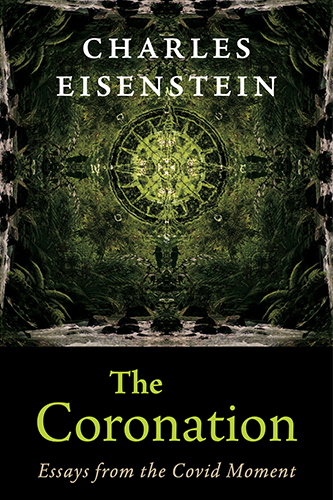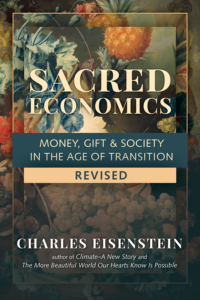Climate — A New Story
Chapters
Chapter 1: A Crisis of Being
The Identity of “They”
Species extinction, as you know, did not end with the nineteenth century. The fate of the passenger pigeon foreshadowed the calamity that is now overtaking life on this planet, a calamity that has left none of us untouched. The calamity is the impoverishment of life, in every sense of that phrase. Extinction is one kind of impoverishment; the more general decline in biodiversity is another; so also with the spreading deserts on land and in the ocean and the general depletion of life even where it is green. Even when species don’t go extinct, often they decline to small remnant populations, shrink to a small portion of their original range, lose subspecies and genetic diversity, and inhabit vastly simplified ecosystems. This withering of biological life accompanies the impoverishment of human life and cultural vitality. All partake of the same crisis.
I recently made the acquaintance of a farmer in North Carolina whom I’ll call Mike, a man of the earth whose family has been here for three hundred years. His thick accent, increasingly rare in this age of mass-media-induced linguistic homogenization, suggested conservative “Southern values.” He was indeed full of bitterness, though not against the usual racial or liberal suspects; instead he launched into a tirade about the guvmint, chemtrails, the banks, the 9/11 conspiracy, the apathy of the “sheeple,” and so on. “We the people have got to rise up and smash them,” he said, but there was no fervor in his voice, only a leaden despair.
Tentatively, I broached the idea that the perpetrators of these crimes are themselves imprisoned in a world-story in which everything they do is necessary, right, and justified; and that we join them there when we adopt the paradigm of conquering evil through superior force. That is precisely what motivates the technologies of control, whether social, medical, material, or political, wielded by those we would overthrow. Besides, I said, if it comes down to a war to overthrow the tyrants, if it comes down to a contest of force, then we are doomed. They are the masters of war. They have the weapons: the guns, the bombs, the money, the surveillance state, the media, and the political machinery. If there is hope, there must be another way.
Perhaps this is why so many seasoned activists succumb to despair after decades of struggle. Dear reader, do you think we can beat the military-industrial-financial-agricultural-pharmaceutical-NGO-educational-political complex at its own game?[4] The modern environmental movement, and especially the climate change movement, has attempted just that, not only risking defeat but sometimes worsening the situation even in its victories. The ecological crisis is calling us to a deeper kind of revolution. Its strategy involves restoring what the modern worldview and its institutions have rendered nearly extinct: our felt understanding of the living intelligence and interconnectedness of all things. To not feel that, is to be not fully alive. It is to live in poverty.
Mike wasn’t understanding me. He is an intelligent man, but it was as if something had possessed him; no matter what I said, he would pick up on one or two cue words to pour forth more bitterness. Obviously, I wasn’t going to “defeat the enemy” by force of intellect (thus enacting the very same paradigm I was critiquing). When I saw what was happening, I stopped talking and listened. I listened not so much on a semantic level, but to the voice beneath the words and to all that voice carried. Finally I knew what to do. I asked him the same question I want to ask you: “What made you into an environmentalist?”
That is when the anger and bitterness gave way to grief. Mike told me about the ponds and streams and wild lands that he hunted and fished and swam and roamed in his childhood, and how every single one of them had been destroyed by development: cordoned off, no-trespassed, filled in, cut down, paved over, and built up.
In other words, he became an environmentalist in the same way that I did, and, I am willing to guess, the same way you did. He became an environmentalist through experiences of beauty and loss.
“Would the guys ordering the chemtrails do it, if they could feel what you are feeling now?” I asked.
“No. They wouldn’t be able to do it.”
The truth of that moment Mike and I shared stands alongside the reality that, actually, they would be able to do it, that “they” in fact includes each one of us who participates in this civilization. A single moment of reverence, gratitude, or grief, however profound, is not enough to undo generations of programming, nor to extricate ourselves from an economy and society of ecocide. Are you able to get into your car, knowing the effect of emissions and oil spills and the geopolitics of oil extraction? I certainly am, and you probably are too. You might have a story about why it is okay, why in your case it is justified, or at least why you are okay for doing it. “I have no choice,” you might think. Or “At least I feel bad about it. At least I’m opposed to it. At least I vote for people or donate money to organizations who are trying to change the system. Besides, I’m driving a hybrid.” All kinds of reasons why it is okay to get into your car right now. Or maybe you don’t think about it at all.
My point here is not that you are deluding yourself—you pathetic, self-justifying hypocrite! It is to illuminate the fallacy of our judgments and the war thinking that they engender. And it is to suggest that we are not normally feeling what Mike was describing, because we live in a system, an ideology, and probably a wounded psychology that allow full feeling only sporadically. The system numbs us; it also depends on our numbness.
I want us to transcend the language of “Is it okay?” entirely, and underneath it, “Am I okay?” This is the language of war turned inward. Along with defeating the enemy, we seek to conquer its internal projection: the greedy, hypocritical, dishonest, egotistical, self-serving parts of ourselves. In this campaign, self-disgust is considered an ally, the first sign of redemption, because now we are joining the good side, with parts of ourselves as the enemy. Dissociating from those parts, we imagine that we are making progress in overcoming them. Such great efforts we are making, such commendable progress.
Are we ever making progress though? Or is any progress merely in our ability to excuse, cloak, and rationalize the choices that don’t fit the image of our ethics?
Corporations and governments do just that: they cloak, they excuse, they deny, and they make cosmetic, self-justifying changes to uphold a green image. We would like to blame greenwashing on corporate duplicity and greed—giving us an external enemy to fight—but (like our own self-justifications) I am afraid it is rooted in something much deeper.
In both cases, personal and political, to blame moral failings for the horrifying predicament of people and planet is a dangerous error that diverts attention away from systemic and ideological causes. It disguises a problem that we don’t know how to solve as a problem that we do. We know, in theory at least, how to stop bad people from doing bad things. We can deter them, surveil them, imprison them, or kill them. We can fight them, and if we win the fight, the problem is solved.
Our political discourse is rife with good-versus-evil narratives. It is obvious to each side that they are good and the other side is evil (or some cipher therefor: sick, irrational, twisted, unethical, corrupt, “acting from the reptilian brain,” etc.). Both sides agree on that. Therefore, both sides also agree on the strategic template for victory: arouse as much outrage and indignation as possible among the Good Folk so that they will rise up and cast down the Evil Folk. No wonder our civic discourse has degenerated into such polarized extremes.
That does not mean that I hold no opinion about which side is right in the political questions of our day. Nor am I saying that truth is a matter of opinion or that we create our reality. It is rather that those in our society typically misunderstand the causes of others’ opinions and behavior.
To blame evil is to misdiagnose the problem. I explored this idea in depth in my last book; here I’ll just ask you to insert yourself into the totality of the circumstances of a fracking executive. The “totality of circumstances” could include:
- The corporate culture
- The culture of the energy industry
- Performance pressure
- Economic pressures on the business, rooted in the economic system
- Years of attacks from hostile “enviros” who appear to you to be ignorant and misguided
- Stories of “American energy independence”
- Ideologies of progress, growth, and technology
- The perceptual set of Earth-as-thing
- Childhood “success” programming
What actions would you take from those conditions? What would be your hardest choices? Your most painful compromises?
What are your hardest choices and most painful compromises right now? Do you drive a car that burns gasoline? Did you drive somewhere when it was raining yesterday, when you really could have biked? Do you take energy-consuming hot showers? Do you tread on cement sidewalks? Do you use a cellphone containing conflict minerals? Do you use credit cards or banks who fund the pillage of nature? If so, someone out there probably thinks you are evil too. Exploiter! Hypocrite! Consumer of more than your share! You might sometimes think that about yourself too. Other times, you will have compassion for yourself, realizing that given your circumstances, your burdens, your traumas, and your limitations, you are doing the best you can.
Does this mean we might as well give up on change? No. It means we need to ask, What are the circumstances that give birth to the choices that are harming the world? Engaging other people, we have to ask the question that defines compassion: What is it like to be you? The more we understand, the more we live in reality and the less we inhabit a fantasy world populated by our projections. You can go ahead and see your opponents as dastardly villains, but if that is not the truth of who they are, then you are living in a delusion. Focusing on the bad guys, we become blind to deeper, systemic causes, forever chasing false solutions that actually maintain the status quo.
Living in a delusion, we endlessly re-create its landscape; we repeatedly enact its roles and manufacture its dramas, racing along the same old paths of the maze. Even if we achieve temporary victory against the bad guys, the overall situation doesn’t seem to change. We never get closer to the exit. What we normally achieve is, instead of victory, a strengthened conviction that we are in fact the good guys. That polarized view is one of the things we will have to give up if we are to launch the era of ecological healing. Are you prepared to sacrifice being the winner? Are you willing to sacrifice being one day proved right? Are you willing to stop seeing yourself on Team Good fighting Team Evil? Because that’s one thing that both sides of any debate normally believe of themselves, and that is the template of “othering” that exemplifies and reinforces human separation from nature.
I ask these questions deliberately. I will argue in this book that all the positions on the spectrum of climate change opinion, from skepticism to catastrophism, are wrong. Like those who blame evil people for the world’s evil, they operate in too shallow a causal framework. The totality of circumstances driving ecological degradation and climate derangement is greater than conventional opinion recognizes.
End Notes
[4] I hope I haven’t left anyone out—I don’t wish to be rude.






